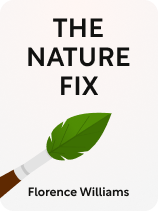

This article is an excerpt from the Shortform book guide to "The Nature Fix" by Florence Williams. Shortform has the world's best summaries and analyses of books you should be reading.
Like this article? Sign up for a free trial here.
Feeling stressed, depressed, or just generally unhealthy? When was the last time you spent time outdoors?
In The Nature Fix book, Florence Williams explains how researchers are tapping into the healing power of nature. She shares the many proven benefits of spending time outside—and what those of us living in the urban jungle can do to reap its benefits.
Continue reading for an overview of The Nature Fix.
The Nature Fix—Overview and Lessons
Feeling stressed, depressed, or just generally unhealthy? Consider the last time you went outside. In The Nature Fix book, Florence Williams contends that humans have an innate affinity for nature, and thus the antidote to many of our physical and mental ailments is a good dose of the outdoors. From the practice of forest bathing in Japan to horticulture therapy in Sweden and river rafting in Idaho, Williams explores how researchers are tapping into the healing power of nature—and what those of us living in the urban jungle can do to reap its benefits.
Williams is a journalist, speaker, and contributing editor at Outside Magazine, and she has written for other publications such as the New York Times, National Geographic, and The New York Review of Books. She’s received numerous awards for her books, including the 2013 Los Angeles Times Book Prize for Breasts and the 2023 PEN/E.O. Wilson Literary Science Writing Award for Heartbreak. The Nature Fix was published in 2017 and was a bestseller on the audiobook platform Audible.
Our guide begins by discussing how our lives and health have changed as we’ve increasingly become a city-dwelling species. Then, we’ll explore the research-backed benefits of being outdoors and take a look at how different countries are supporting their citizens’ health by giving them better access to nature. We’ll conclude with Williams’s prescription for using nature to improve our well-being. We’ll also include other experts’ and authors’ insights into the relationship between nature and health.
Humans Are Now an Urban Species
Williams explains that humans are losing touch with nature because we’re now predominantly city-dwellers, and this has impacted our health and well-being. In this section, we’ll discuss the change in our environment and how this has affected us, for better and for worse.
Humans Are Drawn to Nature
Williams explains the theory of biophilia, which is the idea that humans are innately drawn to nature. The theory posits that for most of human history, we depended on nature for food, shelter, and survival. Thus, our ancestors developed a deep understanding of the natural world, and our brains evolved to give us an instinctual need to interact with nature.
However, humans are moving farther away from nature: Williams says that since 2008, a greater portion of the global population is living in urban areas and two billion more people are projected to become city-dwellers over the next few decades.
The allure of cities, says Williams, is that they offer advantages that many rural areas lack, such as better educational and job opportunities, better infrastructure, more innovation, and more gender equality.
The Cons of City-Living
While city living has its advantages, these come at a price. Williams writes that our brains still crave nature, so living in urban areas and having limited access to nature negatively affects our health and well-being. We’ll explore these effects next.
We’re Mentally Worn Down
First, living in the city means dealing with more noise, demands, and distractions, which make us more stressed and mentally exhausted.
Williams explains that city folk are constantly exposed to an urban soundtrack of police sirens, airplanes, and other man-made noises. These ever-present noises prevent us from fully relaxing; since our brains equate noise with threats, we’re perpetually in a state of alertness. Being on alert translates to an elevated heart rate and blood pressure—in other words, stress.
Exacerbating this stress is the multitude of things fighting for our attention, from a steady stream of emails to a limitless selection of TV shows. Over time, says Williams, the micro-stresses from our daily exposure to noise and stimuli accumulate into chronic stress (a prolonged state of stress), which leads to all sorts of physical ailments, including cardiovascular issues.
In addition to being stressed, we’re also mentally exhausted by the things that clamor for our attention. Williams explains that, according to Attention Restoration Theory (ART), we have two kinds of attention: The first is directed attention, which is the kind of focused, effortful concentration we use to meet the demands of city life—working on a project, navigating a busy street, responding to emails. The second is soft fascination, the effortless, involuntary attention we pay to things that are interesting or beautiful, like natural scenes such as the view from a mountaintop.
Because we live away from nature in cities, we use too much of our directed attention, and we don’t get many chances to engage in soft fascination. Williams argues that this leads to mental fatigue, making it harder to concentrate, solve problems, and control impulses, and possibly results in attention-related issues like ADHD and burnout.
We’re Getting Poor-Quality Sleep
Aside from stressing us out in our waking hours, man-made noises also affect the quality of our sleep, explains Williams. Even as we sleep, we’re subconsciously attuned to noise—a nifty feature when our ancestors had to be able to detect threats while asleep (say, the sound of an approaching predator); not so nifty now that we don’t have the same threats our ancestors faced. This means we’re not getting enough restorative rest.
We’re Not Getting Enough Sunlight
Another effect of spending more time indoors is that we’re missing out on the health benefits of sun exposure. Williams writes that the lack of sunlight means we’re not getting enough vitamin D; as a result, children in some parts of the UK have started developing rickets, a bone disease that results from vitamin D deficiency.
In addition to not getting enough vitamin D, we’re also suffering from myopia or nearsightedness. Williams explains that sunlight plays a role in shaping our eyes, so being indoors and away from the sun affects the development of our eyesight. Staring at a laptop or phone screen all day doesn’t help our vision either.
We’re Less Empathetic
Williams writes that on top of having negative effects on our mental and physical health, city living also affects us emotionally, making us less empathetic. Williams explains that being indoors means we miss out on the sense of wonder we get when we see nature’s beauty and grandeur, and this affects our feelings of connection with others. This is because research has found that this awe from seeing nature makes us more attuned to the larger world and the people around us.
The Benefits of Being Surrounded by Nature
Now that we’ve discussed the detrimental effects of urban living, we’ll explore what the research says about how nature can improve our health and well-being.
Nature Reduces Stress
Williams writes that spending time in nature can reduce stress. Research in Japan supports this: In response to the high levels of stress and burnout in the country’s workforce, it has included the practice of shinrin-yoku (forest bathing, or immersing yourself in the forest) in its national health program, offering a network of forest therapy trails and facilities to its citizens. Walking through forests has been found to lower levels of cortisol (a stress hormone), heart rates, and blood pressure, and it also reduces anxiety.
Part of nature’s stress-reducing properties comes from sound, says Williams—we respond especially well to the sound of water and birds (but think songbirds instead of crows).
Williams adds that on top of its soothing sights and sounds, nature’s smells also contribute to reducing stress. Scents have a potent, immediate effect on us because they skip the bloodstream and go straight to our brain.
Some natural scents—such as pine and eucalyptus—have long been used in aromatherapy to promote relaxation, alleviate stress, and improve sleep. Williams does add that further research needs to be done to support aromatherapy’s healing effects.
Nature Boosts Our Immune System
According to Williams, studies have found that nature can help us stay healthy or recover from illness. Research shows that people who engage in forest bathing have an increase in the activity of their natural killer immune cells, a type of white blood cell that helps fight off cancer.
Williams also cites other research that found that hospital patients who had a view of nature recovered faster and needed less pain medication than those who had a view of a brick wall.
Nature Improves Cognitive Function and Creativity
Another benefit we get from being in nature is that it enhances our cognitive function and boosts creativity. Williams cites studies where groups of people went on trips to the wilderness for three to four days to go rafting, hiking, and camping while being disconnected from technology. Participants’ cognitive abilities—including attention, memory, and creative problem-solving—all improved after their trips. This suggests that ART was at work: Nature provided participants with an opportunity to engage in soft fascination, giving their directed attention a break and boosting their brain power.
Nature Improves Our Mental Health and Social Connectedness
Williams cites research that nature can be as effective as medication in treating mild to moderate depression. For example, in Sweden, horticulture therapy, or gardening as a form of treatment, has been shown to reduce symptoms of anxiety and depression.
While even short doses of nature—such as a quick walk in a city park—can provide a mood boost, Williams argues that more immersive experiences can have more profound and lasting effects. (We’ll go into detail about her recommended doses of nature later in the guide.)
She gives the example of a river-rafting trip in Idaho, designed for a group of US veterans suffering from post-traumatic stress disorder (PTSD). Nature not only provided a soothing environment for the participants but also challenged them as they navigated the river and the wilderness as a team. This was combined with therapy sessions and activities to help participants process their experiences. Williams says that after the trip, many of the participants experienced reduced PTSD symptoms and reported feeling more connected, empowered, and hopeful.
Nature Supports Children’s Development
All of these effects are especially beneficial to children, says Williams. In addition to these benefits, nature also provides children with opportunities for outdoor play—a healthy alternative to sedentary indoor activities—and a rich sensory environment that can help them develop motor skills and spatial awareness.
Research also suggests that time in nature may help manage ADHD in children: Williams points to the difference between those diagnosed with ADHD in the US and Finland, where three-quarters of the country is covered in forests and where nearly all people regularly spend time in nature. Most American children diagnosed with ADHD manage it with medication; on the other hand, most children in Finland do not.
How to Improve Our Health and Well-Being Through Nature
Given nature’s many benefits, what’s a city dweller to do? Simply spend more time in it: Williams says the longer we spend outdoors, the more we’re mentally, physically, and emotionally restored. She recommends aiming for at least five hours a month, with small daily doses of nature at a city park. Spend weekends away from the cacophony of the city, and once a year (or every other year) take an immersive trip out to the wilderness for a few days.
To make the most of your time in nature, Williams offers additional tips. First, go gadget-free. Ditch the earbuds so you can tune into the healing sounds of nature, and leave your phone behind—Williams explains that talking on your phone while you’re outdoors means you aren’t disconnected from the worries of daily life. Second, choose safe areas where you can relax. Williams explains that it’s difficult to unwind if safety is a concern; women, especially, don’t feel as safe as men do when they’re by themselves in more secluded areas, so take precautions and consider group activities and well-populated trails.
However, there’s only so much we can do on our own—we can’t enjoy nature if it’s not accessible to us. Williams says those who oversee schools, hospitals, and neighborhoods should take a more conscious approach to incorporating nature into their environments. Governments can take inspiration from places like Singapore, Japan, and Finland, which encourage their citizens to spend time outdoors by protecting green spaces and developing walking trails and other nature facilities.
Within cities, says Williams, even having more trees and courtyards in neighborhoods can help alleviate stress, reduce aggression, and bring people together outdoors. This consequently reduces crimes and strengthens ties within communities—showing that nature’s nurturing powers go beyond individual health.

———End of Preview———
Like what you just read? Read the rest of the world's best book summary and analysis of Florence Williams's "The Nature Fix" at Shortform.
Here's what you'll find in our full The Nature Fix summary:
- Why humans have an innate affinity for nature
- How some countries are supporting their citizens’ health by giving them better access to nature
- Why the antidote to many of our physical and mental ailments is a good dose of the outdoors






